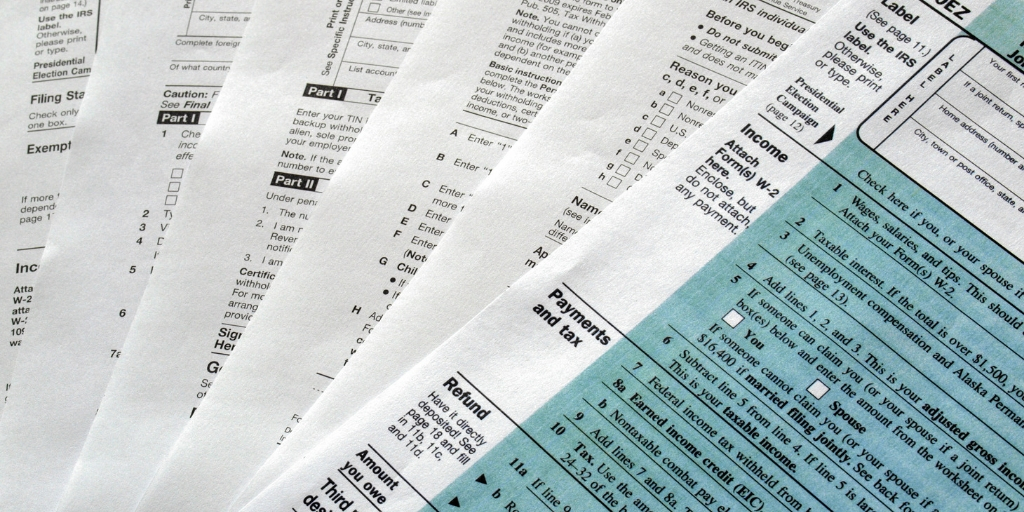February 16, 2022
Your Tax-Preparation Checklist

By Chris Palabe, CFS®, AIF®
Tax season can be stressful and frustrating even in the best of times; factor in two years full of uncertainty and it’s understandable if you want to stick your head in the sand and avoid it. We’re here to help! Here’s the trick: the better prepared you are, the sooner you can shake off that stress and forget about tax filing until next year. We’ve created a tax-preparation checklist to help you do just that!
Organize Your Personal & Income Information
You’ll start receiving various tax documents virtually or in the mail soon, so instead of letting them sit in a pile on your counter, create an organized system for the following.
Income Information
- Form W-2: These are issued by employers and show your wages and tax withholdings. They are supposed to be mailed by January 31.
- Form 1099-MISC: These report income you have received as an independent contractor or freelancer. You should receive one from each person or company that pays you.
- Form 1099-INT: This form will show any interest you have earned.
- Form 1099-R: This form reports income received from annuities, IRAs, or pensions.
- Form 1099-DIV: Any dividend income you earn is reported on this form.
- Form 1099-B or 1099-S: You will receive these if you have any income from the sale of property or stock.
- Form 1098: You will get this from your mortgage company reporting the interest that you paid.
- Form 1098-T: This reports payments of qualified tuition and expenses.
- Form 1095-A or 1095-C: These forms report your healthcare coverage for the year and your premium tax credit, if applicable.
- Schedule K-1 (Form 1065, Form 1120S, or Form 1041): This reports income for a partner, a shareholder, or an income beneficiary of an estate or trust. The Schedule K-1 normal deadline can be as late as April 15th.
- Notice 1444-C or Letter 6475 for the third round of stimulus payments in 2021 (more on this below).
- Letter 6419 for the advanced child tax credit (ACTC) payments you received (more on this below).
Income-Reduction Documents
- Form 1098-E for student loan interest paid, or loan statements for student loans received
- Form 1098-T for tuition paid or receipts from the institution you or your dependents attend
- Receipts for any qualifying energy-efficient home improvements
- Records of IRA contributions made during the year
- SEP, SIMPLE, and other self-employed pension plan information
- Records of medical savings account (MSA) contributions
- Moving expense records
- Self-employed health insurance payment records
- Alimony you paid
Personal Information
If you want your tax-filing experience to be painless, you’ll also want to make sure that you have all of your and your dependents’ personal information available, such as:
- Social Security numbers and birth dates
- Copies of last year’s tax return (helpful, but not required)
- Bank account number and routing number, if you wish to have your refund deposited directly into your account
Gather Documents for Itemization
If you’re planning to itemize your deductions this year, you’ll need records to include your totals and provide proof.
Deductions and Credits
- Childcare costs: provider’s name, address, tax ID, and the amount paid
- Education costs: Form 1098-T, education expenses
- Adoption costs: SSN of the child; records of legal, medical, and transportation costs
- Form 1098: Mortgage interest, private mortgage insurance (PMI), and points you paid
- Investment interest expenses
- Charitable donations: cash amounts and official charity receipts
- Medical and dental expenses paid
- Casualty and theft losses: the amount of damage, insurance reimbursements
- Records/amounts of other miscellaneous tax deductions: union dues; unreimbursed employee expenses (uniforms, supplies, seminars, continuing education, publications, travel, etc.)
- Records of home business expenses
Taxes Paid
- State and local income tax
- Real estate tax
- Personal property tax
New Documents for 2021
In 2021, many people received the third round of Economic Impact Payments (EIP3). In addition, the government launched the Advanced Child Tax Credit (ACTC) payment program. Because of these changes, you must have these new documents when filing your 2021 taxes:
- Notice 1444-C (sent following the stimulus payment) or Letter 6475 (issued in January 2022).
- Letter 6419 (issued by the IRS in January 2022)
If you don’t have these documents, you can log in to your IRS.gov account to find them.
Stay on Top of Tax Changes
Those lists cover the details of what you’ll need in front of you to thoroughly fill out your tax return. But there are also a few things to think about that could impact how you file, such as any changes that have occurred this year. Did you add another child to your family? Did one of your children start college? Did you start taking withdrawals from a retirement account? All these changes need to be reflected on your tax return but won’t show up on prior returns.
More than personal changes, there may be changes to federal or state tax law that you should be aware of for the future. While the success of the Build Back Better Act is still unsure, the proposed tax changes could have major implications for your financial situation, such as the phasing out of backdoor Roths, new surcharges on high-income earners, and changes to taxes for businesses. (1)
Specifically, you should stay on top of annual changes to retirement plan contribution limits. For the 2021 tax year, you can put up to $6,000 in any type of IRA. If you are over age 50, that amount goes up to $7,000 thanks to the $1,000 catch-up contribution. Annual contribution limits for 401(k)s, 403(b)s, and most 457 plans are $19,500. If you are 50 or older, your yearly contribution limit goes up to $26,000. And if you are eligible to contribute to an HSA, you can save $3,600 if you have single medical coverage and $7,200 if you are covered under a qualifying family plan. If you are 55 or older, those limits go up another $1,000. Keep in mind that for IRAs and HSAs, you have until April 15th, 2022, to contribute for the 2021 tax year.
A knowledgeable financial professional can help you understand any tax law changes and how they affect you.
Look Ahead to the Future
Despite how overwhelming things are right now, it’s important to get your 2021 tax return filed properly and accurately. It is just as important to look at the bigger picture of taxes in general, and to make sure you are optimizing all the available tools to limit your tax liability.
Taxes are complicated, to put it lightly, so it helps to work with a professional who understands them if you want to maximize opportunities. An experienced financial professional can also help you with tax planning in light of your unique overall goals and financial plan.
If you want to be proactive about tax planning and you don’t have a qualified advisor yet, we at Palabe Wealth would love to help you experience confidence in every aspect of your financial plan. Schedule a 15-minute introductory phone call or call us at 847-249-6600 to learn if we are the right fit for your financial goals.
About Chris
Chris Palabe is the founder and CEO of Palabe Wealth, a financial services firm providing retirement plan strategies for businesses and individuals. For 25 years, Chris has been serving his clients with customized plans and a boutique approach. He started his firm because of his passion for making a difference in others’ lives and a genuine desire to build long-term relationships with his clients so they can seek to achieve their ideal retirement and manage risk. Chris is a Certified Fund Specialist® (CFS®) and Accredited Investment Fiduciary® (AIF®) professional and has a degree from Université Denis Diderot (Paris VII). When he’s not working, you can usually find him riding horses and competing in dressage at a national level. He also loves reading, watching movies, and eating out. To learn more about Chris, connect with him on LinkedIn.
This information is not intended to be a substitute for specific individualized tax advice. We suggest that you discuss your specific tax issues with a qualified tax advisor.
This material was prepared for Palabe Wealth Inc.’s use.
___________
(1) https://taxfoundation.org/build-back-better-plan-reconciliation-bill-tax/

Chris Palabe, CFS, AIF®
Chris Palabe is the CEO and a Financial Advisor at Palabe Wealth, a firm that provides exceptional expertise in the Financial Planning space. For over 25 years, he has cultivated a deep understanding of the complexities of wealth management and retirement planning, making him a valued advisor to both Plan Sponsors of 401(k) plans and Individual Investors.
Holding esteemed designations such as Certified Fund Specialist (CFS) and Accredited Investment Fiduciary (AIF), Chris showcases his commitment to upholding the highest standards of investment advice and fiduciary responsibility in his advisory relationships. These designations are a testament to his knowledge and dedication to providing clients with sophisticated and ethical financial guidance.
He holds his Series 6, 7, 63, and 65 licenses through LPL Financial, which qualify him to offer a broad range of financial products and services.
Chris’s distinguished career is characterized by his unwavering commitment to his clients' financial well-being. He focuses on crafting tailored strategies that aim to optimize retirement outcomes and financial independence. He continually strives to help the individuals he works with on their path towards financial success.
Over the years Chris has refined a consistent, strategic investment philosophy supported by a significant body of academic research. He believes that a widely diversified portfolio of investments tailored to each client’s unique risk tolerance and financial goals is the key to their financial success.
Beyond his professional achievements, Chris has a profound passion for dressage, a highly skilled form of horse riding performed in exhibition and competition. This discipline requires a remarkable level of dedication, precision, and harmony between rider and horse, qualities that mirror his approach to financial planning.






